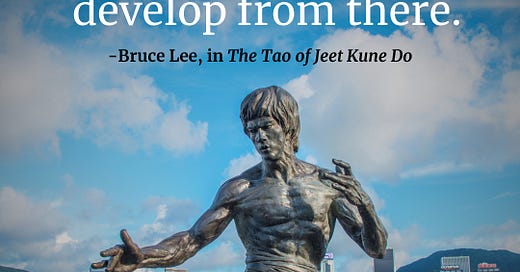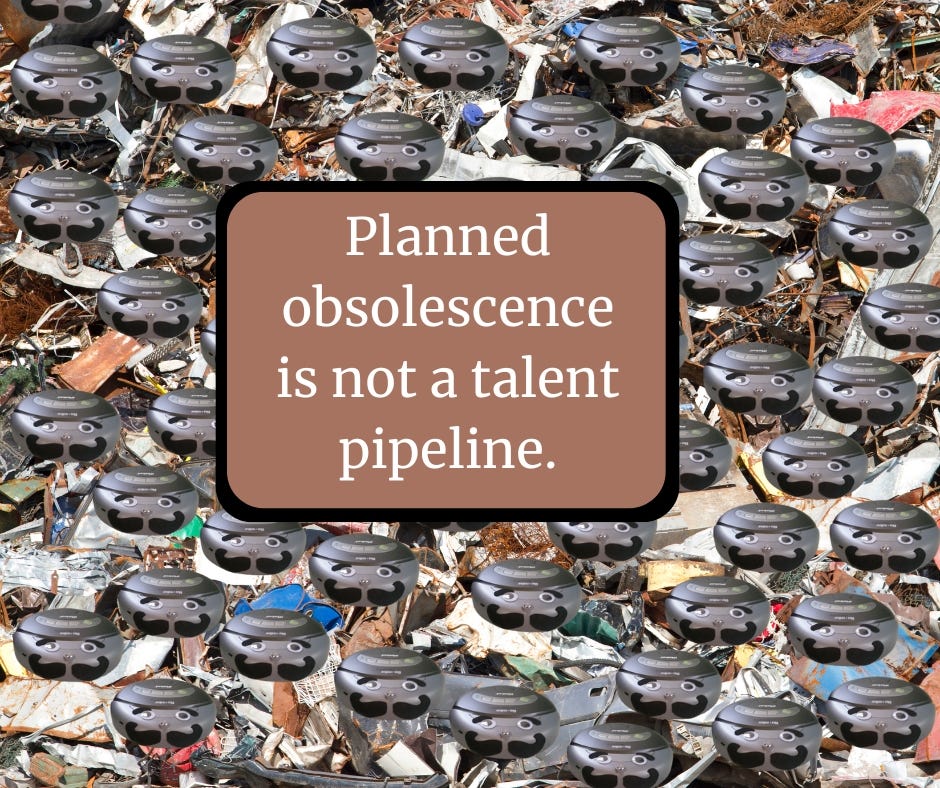Your friendly Bookseller is a weird nerd. My special interest has been “human relationships in systems” for a really long time. Where are we going? How will we get there? How should we treat each other along the way?
And why does work just stink so much? Why do I hate offices? Why does having a boss feel like wearing a straitjacket 24/7?
My conclusion is: because modern management theory is a fascist worldview influenced by cultural appropriation mixed with white supremacy and plantation slavery, flavored throughout with Calvinist patriarchy.
No one needs any of it.
I have a freakish but extremely effective management style, which allows The Reading Room CLE to recruit skilled and dedicated workers away from higher-paying jobs at larger institutions, typically under market rate, and retain them long-term.
Inspired by Bruce Lee, we do what works, and we do not do what does not work.
I thought you, our Readers, might like to know how we do things around the shop. My own management reading list and commentary follows.
We are powered by kindness, positivity and optimism. That’s how we transform ourselves, this city and its people.
We all move through our lives with our beliefs in one hand and our doubts in the other; hope is what keeps us moving forward. Taking inspiration from the hopepunk movement, we cultivate and practice kindness and hope not because they are supported by the facts but because the practice gives us strength and makes us a resilient team.
Assume positive intent when interacting with others, then also act with positive intent first as we work together!
We are a team.
We have a flat(tish) power structure and I have a consultative management style. When I hire someone to help out at the shop, I’m not hiring a robot so I can put a wire in their brain and tell them what to do. I’m presenting that person with a problem I’ve created, and asking for their help.
Whether it’s a massive pile of books that need shelving, a floor that needs vacuuming, or a contract that needs review, we trust our workers to approach the task with competence and dedication.
Apologies rejected!
If we wanted to hire a bunch of Roombas, we would. We could run them till they break, and then throw them away like trash, and it would be horrible. We hire humans and we treat each other like humans.
No one needs to be sorry for being a human person with a human body and a human life. If a worker is late or will miss work or delay a project, we appreciate knowing, in advance if possible, so we can plan effectively.
No one needs an overseer.
We don’t have or need a timeclock, and we aren’t spying on people’s bathroom breaks. That is overseer culture and we don’t want it. We don’t police each other. We don’t boss each other around.
We don’t use deadlines. We use startlines: we start our projects when the work and the worker are ready.This is not a sprint or marathon but a relay. We prioritize rest and play over efficiency and throughput.
If timeliness or skill becomes a problem, we deal with that problem on its own. Our workers do not need punishment or discipline.
If people are chronically unreliable and it means we’re short staffed: we hire more workers to fill in.
If people lack skill: we train them.
If people don’t enjoy and excel at the work they were hired to do: we take it off their plate, and offer them work that suits them better, as soon as it’s available.
We will not shave down square pegs to fit them into round holes. We are a flock of odd birds and we treasure our uniqueness. Keep your beak and claws to yourself, please, and tuck your wingtips inside the car.
We accept the gift of labor gratefully.
We are desperately dependent on the generosity of the individual volunteers who support us and carry out the vast majority of our work. We treat our volunteers’ gifts with respect, making sure that folks who come to help out have a good experience and enjoy the fruits of their own labor. If you volunteer for a project or event, you should expect to work ⅓ of the time and participate ⅔ of the time.
We know that people work effectively and well when they are valued and thanked, and we practice gratitude for both paid and unpaid workers. We give each other grace and assume the best of intentions, knowing that everyone gets short-tempered and snippy once in a while.
We honor the value and dignity of labor.
When we do pay for labor we pay everyone the same flat thriving wage. We prioritize paying for work that has historically been gendered or racialized, like cleaning the shop or hauling heavy book boxes. We respect executive leadership skills, but our leadership team is almost entirely volunteer.
We ask questions and offer help before criticism.
We seek feedback regularly and proactively, consider the recipient’s experience, and ask for consent before offering advice. We approach our work with humility, openness, and curiosity, knowing that no one has all the answers, but everyone is an expert in something. We value the gift of expertise and treat it with respect. If we discover a problem we don’t know how to solve, we bring it to the group for deliberation.
Suggested reading:
The Toyota Way: A lot of people hate Kaizen/Lean/TTW but I love it. I 5Sed my own house! This is a system that empowers workers to build a better workplace. It values worker well-being as a strategic business priority. If you have a low opinion of The Toyota Way, ask yourself: which of your concerns have been added over time, especially by Americans, who operate from the cultural assumptions of white supremacy and chattel slavery.
Speaking of: here’s a book about the way that modern management theory arises from and depends on the assumptions of plantation slavery.
And here’s a book about the way all of that got even worse when Nazi managers showed up after WWII and started dominating the conversation about labor and leadership.
Here’s my favorite agribusiness writer, Sarah Taber, talking about management in the food system.
Here’s a public home economist keeping life both tasty and truthful.
Here’s Madeline Pendleton’s book, which includes the story of founding Tunnel Vision, and running it in a sensible, ethical way.






